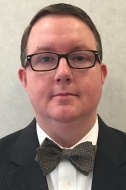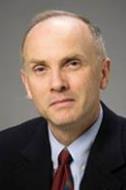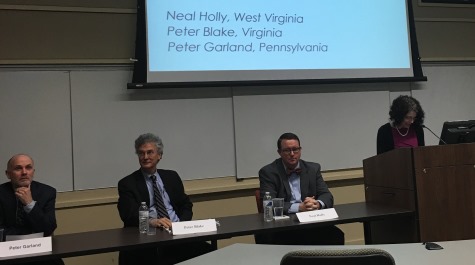The State of Higher Education — Policy Makers’ Perspectives
 On February 4, the Higher Education Program sponsored a panel of higher education policymakers representing three different states. The State of Higher Education: How Three States are Approaching Higher Education focused on the policy initiatives and concerns impacting higher education in Pennsylvania, West Virginia, and Virginia. Panelists included:
On February 4, the Higher Education Program sponsored a panel of higher education policymakers representing three different states. The State of Higher Education: How Three States are Approaching Higher Education focused on the policy initiatives and concerns impacting higher education in Pennsylvania, West Virginia, and Virginia. Panelists included:
• Neal Holly, PhD ’12, Vice Chancellor for Policy and Planning for West Virginia’s Higher Education Commission, who oversees data collection, reporting, and system research, including the state’s master plan and P-20 longitudinal data system.
• Peter Blake, Director of the State Council of Higher Education for Virginia, who oversees higher education analyses in the areas of faculty and staff compensation, funding policies, academic libraries, distance learning and instructional technology, and student financial aid.
• Peter Garland ’77, M.Ed. ‘79 Executive Vice Chancellor for Pennsylvania’s State System of Higher Education, who oversees employee and labor relations, information strategy, and system research and planning. Garland also serves on the School of Education Development Board.

 Panelists began with an introduction of how each got to their current position, demonstrating that the policy route is often not the first choice for students finishing their graduate degrees. Although they may have come to their current roles via the newspaper business, student affairs, or as a result of the faculty search, it was clear to attendees that the panelists were both well-informed and passionate about educational policy in their respective states.
Panelists began with an introduction of how each got to their current position, demonstrating that the policy route is often not the first choice for students finishing their graduate degrees. Although they may have come to their current roles via the newspaper business, student affairs, or as a result of the faculty search, it was clear to attendees that the panelists were both well-informed and passionate about educational policy in their respective states.
After a synopsis of the current educational policies in each of the three states, panelists spoke about some of the key issues facing policy makers, including resource constraints, competition, and demographic changes. These issues coupled with the strain of a completion agenda produced lively conversation about the importance of closing gaps in access, as well as in the conferring of degrees. Panelists stressed the importance of building buy-in with institutional leaders in order to address policies geared toward student success initiatives, particularly in cases where the initiatives being adopted are externally funded through private foundations.
Educational Policy, Planning, and Leadership (EPPL) doctoral student Davis Clement reflected, “The disparity between Pennsylvania, West Virginia, and Virginia's levels of state support for higher education was eye-opening. The differences in perspective were illuminating—one administrator would be more interested in implementation and meeting existing mandates, while another would be more interested in voting blocs of support for new initiatives (or opposition to improvement).
Blake talked about how the Virginia secretary of education is asking institutions with higher completion rates to ‘open their doors wider’ and take risks on admitting different populations of students, which is an interesting move. The idea of asking participants in a rigid accountability system to exercise flexibility because of their high performance within that system seems like an acknowledgment that rigid accountability systems discourage enrollment of more diverse student populations.”
Panelists pointed to two primary avenues for addressing the student completion rates: developmental education reform and the ‘15 to Finish’ initiative, which encourages students to take 15 credit hours a semester. In West Virginia, Holly stated that student success among community college students who participated in co-requisite remediation while enrolled in college level courses improved from 36% to 60%. In Virginia, Blake explained that students who enrolled in 15 credit hours were eligible to receive more support through financial aid mechanisms.
 Enrollment instability and its impact on Historically Black Colleges and Universities (HBCUs) was also targeted as an area of concern across all three states. With institutions being called to increase diversity, students have more options for college enrollment. In Pennsylvania, Garland explained that students may receive better financial and academic support at institutions that are not HBCUs, a contributing factor to the decline in student enrollment within these institutions.
Enrollment instability and its impact on Historically Black Colleges and Universities (HBCUs) was also targeted as an area of concern across all three states. With institutions being called to increase diversity, students have more options for college enrollment. In Pennsylvania, Garland explained that students may receive better financial and academic support at institutions that are not HBCUs, a contributing factor to the decline in student enrollment within these institutions.
The importance of having other states besides Virginia represented also allowed attendees to see the commonalities of interstate policy issues. Terry Hinders (M.Ed. ’13) stated, “What a great opportunity to learn more about the educational priorities in the Commonwealth of Virginia, as well as our neighboring states - West Virginia and Pennsylvania. Access remains a key issue, be it online or brick and mortar. There is much work to be done, both in policy and in practice."
Processing the ideas presented during the salon, Clement noted, “Hearing about the different ways in which public universities are responding to uncertain funding commitments, market competition, and demographic shifts puts into context how policy frameworks actually affect policy. Each of the panelists represented a different response to things like, for instance, student financial need. So it was validating for me, as a student of education policy, to see how existing frameworks in policy research can explain the roots of those differences.”
EPPL Higher Education doctoral student Madeline Smith also commented, "I greatly appreciated the opportunity that the Higher Ed Salon afforded students to gain insight on the interrelated nature of higher education state policy. It was evident from the perspectives provided by the panel members from all three states that the actions taken on a state level can have widespread implications for students across the region and nation."
The Higher Education Salon series began in 2012 and each session focuses on a current event or emerging area of interest and concern within the field. Pamela Eddy, Professor of Higher Education, helped organize the spring salon. According to Eddy, “As we were contemplating the topic for the spring salon, we thought of the ongoing flux in higher education due to state and federal policy changes. We were fortunate to have among our alumni and in the Commonwealth high-level experts from three states with different higher education system organizations. What was rewarding was seeing how many of our faculty, graduate students, and alumni attended the session. The ability to highlight the nexus of theory to practice provides a great teachable moment.”
